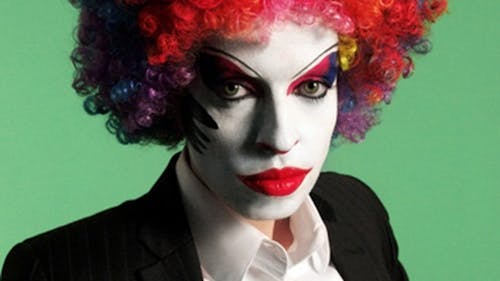Insider Beat: Ina Wudtke takes 'Sledgehammer' to real estate industry with artwork

Ina Wudtke, a conceptual artist based in Berlin, is spending the Spring 2024 semester at Rutgers as a joint Max Kade scholar in residence and Charlotte M. Craig research scholar.
Wudtke’s exhibitions are currently on display in the Channel Media Corridor in the Civic Square Building in downtown New Brunswick and on the fourth floor of the west wing of the Academic Building on the College Avenue campus. In February, they also hosted a lecture, "Counter-Verse: The Spoken Word as a Radical Gesture."
Wudtke’s career spans different mediums, but they made their start in analog photography. Their artwork focuses on education and dismantling hegemonic power structures.
“I always like when there’s dialogue, when you find out something, and when different types of people are included in the dialogue,” Wudtke said about their artwork.
In addition to sparking important conversations, Wudtke wants to ensure their voice is heard.
“Sometimes, I call my art ... Sledgehammer art, because I'm quite clear about my political position,” they said.
One of their most poignant pieces is titled "Entmietung," a German word that translates to "Eviction of Low Income Tenants" in English. The sculpture consists of paper sheets that represent the legal actions that private house owners in Berlin have filed against their unsuspecting residents.
The piece is personal to Wudtke — they lost their apartment due to growing gentrification in Berlin. Their piece calls attention to the problematic practices within the field, specifically in using the rental process for tax write-offs.
This practice has especially become an issue within the art world, with real estate investors using the work of artists to attract wealthy, oftentimes white, potential tenants.
One such example occurred when a real estate developer promoted upper-scale apartments in Berlin with the slogan, "The Fine Art of Living." The irony of this was not lost on Wudtke.
To subvert the power of this campaign, they created a record of the same name, which includes spoken word and spans music genres like jazz and hip hop.
Another piece titled "Vorschlag für eine zukünftige Ausgabe," or “Suggestion for a Future Edition,” features books by anti-fascist writers Margarete Steffin and Bertolt Brecht.
In addition to her artistic accomplishments, Wudtke has worked as an editor at queer magazine NEID, an aspect of their career that is still evident in their work today.
In a recent exhibition, they translated copies of Steffin’s publication "Pirate Jenny." Wudtke sees the medium of magazines as a vital way to make sure their art remains a topic of conversation.
“I liked the way to not be in an art exhibition, but to be among many people,” Wudtke said when speaking about their use of magazines. “To be able to share your art and also to give it away for free, so that people at home can look into it.”
A prominent throughline in all of Wudtke’s work is people. In addition to her work featuring Steffin, Wudtke is currently finishing a piece on Black German activists, including singer Fasia Jansen. Wudtke plans to create an audio self-portrait of Jansen, which will be narrated by Black and queer activist Jasmin Eding.
Wudtke specifically wants to highlight artists that may have been lost to time and to censorship by restrictive governments.
“I think it’s worth to learn about this past so that nowadays with (former President Donald J. Trump) and the conservatives in Germany getting back to power,” Wudtke said. “We really have to do our homework in order not to repeat the same mistakes.”



